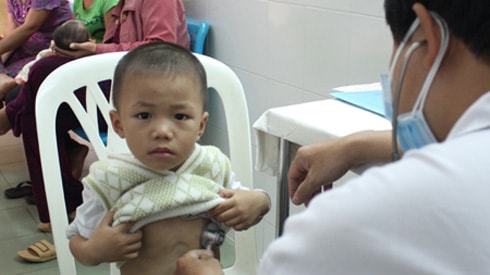How to prevent meningococcal disease
Meningococcal bacteria reside in the throat and are then spread from person to person through the respiratory tract.
According to infectious disease specialists, about 20% of healthy people carry meningococcal bacteria. The disease only develops symptoms when the body is weak. Most patients recover, but in a few acute cases, the patient may develop sepsis and die if not treated promptly. 5 provinces and cities have recorded patients with meningococcal disease, including: Hanoi, Ho Chi Minh City, Long An, Binh Phuoc and Quang Tri. To help readers have more information on how to prevent this disease, VOVonline reporters interviewed Dr. Nguyen Tien Lam, Head of the Virus - Parasite Department, Central Hospital for Tropical Diseases.
PVDoctor, what are the symptoms of meningococcal meningitis?
Doctor Nguyen Tien Lam: Depends on the type of disease. One is the type of infection that carries bacteria but has no symptoms. Two is the symptom of sore throat. Three is the type of bacteremia. Four is the symptom of meningitis.
However, in cases where the patient has symptoms of meningococcal infection, the first symptom is fever, and local symptoms such as lesions in the nose and throat.
In the case of patients with sepsis, there are severe systemic symptoms with rash, purpura and circulatory disorders, circulatory failure, shock... If the patient has meningitis, in addition to the above symptoms, there are also manifestations of the nervous system such as fever, nausea, vomiting, headache, stiff neck...
PV:So how does this disease spread, doctor?
Doctor Nguyen Tien Lam: This is a disease caused by bacteria. Meningococcal bacteria reside in the throat, then spread from person to person through the respiratory tract; through coughing, sneezing... spreading tiny droplets of saliva containing bacteria into the air.
People with meningococcal disease can be healthy carriers of the bacteria, without any signs or symptoms, even though there are still bacteria in the throat.
The second type is bacteria that reside in the throat and cause symptoms such as fever, cough, sneezing, runny nose, sore throat...
There are two more serious forms of the disease: bacteria spread through the blood to the central nervous system causing purulent meningitis due to meningococcus, spread in the blood, becoming septicemia. Symptoms of septicemia are high fever, chills, very severe infection, the patient has rash. The rash will be large and hemorrhagic, the necrosis will spread and necrosis in the center becomes purulent rash. The changes reduce blood pressure and even lead to shock. If not treated promptly, it can easily lead to death. These are forms of septicemia.
Symptoms of meningitis caused by meningococcus include sudden high fever, headache, nausea, photophobia... symptoms such as stiff neck, severe cases include lethargy, mental disorders... can even lead to coma.
PV:Doctor, what is the progression of encephalitis?
Doctor Nguyen Tien Lam: There have been more than 10 cases of meningitis across the country. Since the end of 2011, the Central Hospital for Tropical Diseases has received 2 cases positive for meningitis virus, treated and discharged the patients.
All levels are informed about the situation of meningococcal cases, symptoms, and places where patients reside to coordinate with preventive medicine to isolate the area.
In addition, propaganda work on the use of prophylactic antibiotics for contacts and medical staff is also carried out.
|
Children are susceptible to meningococcal infection. |
PV:What should people do to prevent this disease, doctor?
Doctor Nguyen Tien Lam: Like other respiratory diseases, prevention is: actively wearing masks, limiting crowds, and maintaining good hygiene. Those who come into contact with or care for patients must wear masks and use antibiotics or preventive medication.
People living in endemic areas, or who have been diagnosed with meningococcal disease, should consider taking antibiotics and getting vaccinated against the disease. There is a vaccine available.
When people have symptoms, they need to go to a medical facility immediately for examination and treatment.
PV:Currently, in Hanoi, many people are rushing to get vaccinated. What advice do doctors have for people?
Doctor Nguyen Tien Lam: Hanoi is not currently identified as an epidemic area of meningococcal meningitis, so normal people do not necessarily need to get vaccinated.
The recommended vaccine should be used for children aged 2-5 years, those at high risk of infection such as those aged 14-19 years, or those living in epidemic areas. If the vaccine is of good quality and injected properly, it will not affect health.
Meningococcal vaccines are imported from abroad, but compared to other vaccines such as flu vaccines, the economic problem is not a big one.
PV:Thank you doctor./.
According to VOV







